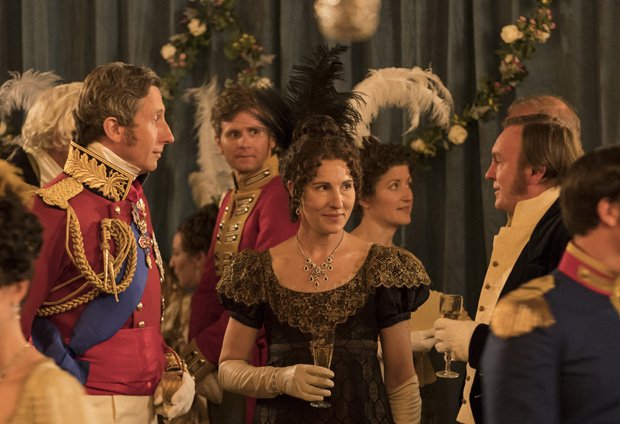
Julian Fellowes never wrote a truer word. The past is indeed a strange country, at least as it is portrayed in this new six-part costume drama which begins in the Regency era and moves swiftly into the Victorian age.
I am not over familiar with Julian Fellowes’ oeuvre although I have watched a couple of episodes of Downton Abbey when it was polite to do so, and I have to say, they were really quite good. The characters were engaging and the intrigue, well, intriguing. Good solid soap, if there is such a thing.
Belgravia is something else.
It’s 1815 – we are in CGI-Brussels at the Duchess of Richmond’s ball on the eve of Waterloo. Mr Trenchard (Philip Glenister), a plain-talking victualler (or ‘vittler’ if you are posh) to Wellington’s army, who has hauled himself up by his bootstraps to make a shedload of money, is there with the wife (Tamsin Greig, one of my favourite actors) and their pretty teenage daughter Sophia (Emily Reid), who is smitten with dashingly handsome red-coated Lord Bellasis. Bellasis seems smitten with her too – but, as the Trenchards, or least Mrs Trenchard, know – Bellasis and his ilk are Not For The Likes Of Us. The Trenchards are trade, nouves, and it can never be.
Anyway, it’s all turns out to be irrelevant because all the blokes run off to the battle and the young man gets himself killed. Cue pretty weeping from Sophia.
Jump ahead 25 years, during which it’s obvious the make-up staff are on strike as none of the cast age one bit, and ‘umble Mrs Trenchard is at a new-fangled afternoon tea (releasing explications galore on the social history of tea) and finding unexpected common ground with Bellasis’s mum, the Countess of Brockenhurst (Harriet Walter) no less. They have a stilted convo in which we learn that Sophia died a few months after Waterloo.
Turns out that Bellasis fellow was an utter cad who engineered a fake, secret wedding in which his friend played the part of the priest, in order to have his wicked way with Sophia, who soon afterwards finds herself well and truly Up the Duff and dies in a pool of blood after giving birth to a perfectly formed but sadly bastard son and heir. The baby is whisked away, no doubt, to be brought up in the country by poor but honest peasants.
NOTE: When I said no one ages one bit, I make an exception of Oliver Trenchard, Sophia’s annoying little brother, who grows up to be Richard Goulding (yes, he of The Windsors fame – he was Harry), and has been made to look quite a lot older than his long-suffering mother (possibly in an act of rebellion by the make-up team), and to marry a purse-lipped Cow who is no replacement for the Darling Dead Daughter.
The weirdly familiar phrases the actors are made to spout – ‘they’ are always telling us that ‘the past is a strange country’ according to Mrs Trenchard (Google The Go-Between) – the clichés (‘misery loves company’), the idiotic history essay conversations below stairs where Tamsin Greig’s estimable Friday Night Dinners co-star Paul Ritter has been roped in as butler)… Should I go on? The otherwise talented cast know it’s all been a big mistake and can muster only enough enthusiasm only to deliver the lines not to act them. No wonder Tamsin Greig cuddles that little dachshund in bed at the end. It’s her only comfort in an ongoing trauma. I see from IMDB that she’s in all six episodes. She has my deepest sympathy. I can only wish her well and a new agent.

Thank you so much for the review, I always love your writing!! I’d love to see more reviews of the episodes.
You are so kind, Mary! And I am so sorry to disappoint you. To paraphrase Mr Bennet slapping down poor Mary at the piano in P&P, Belgravia has delighted me long enough…